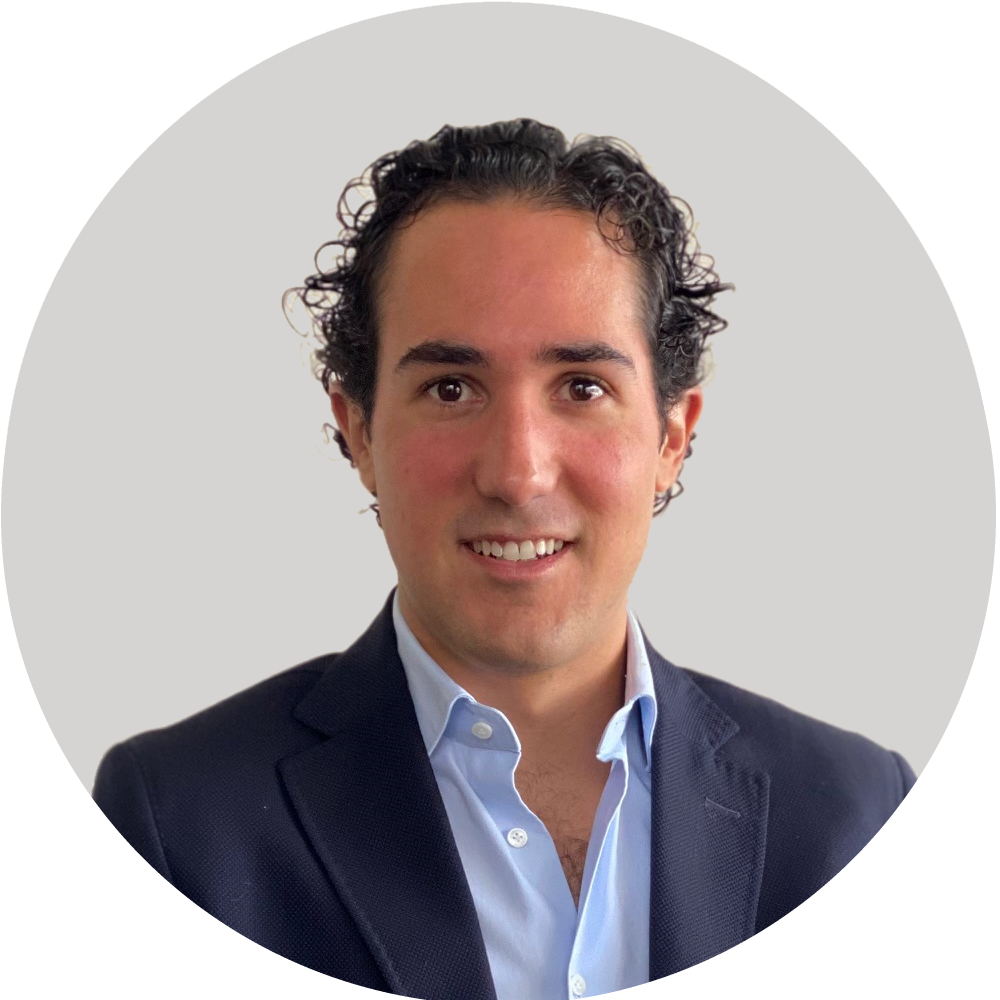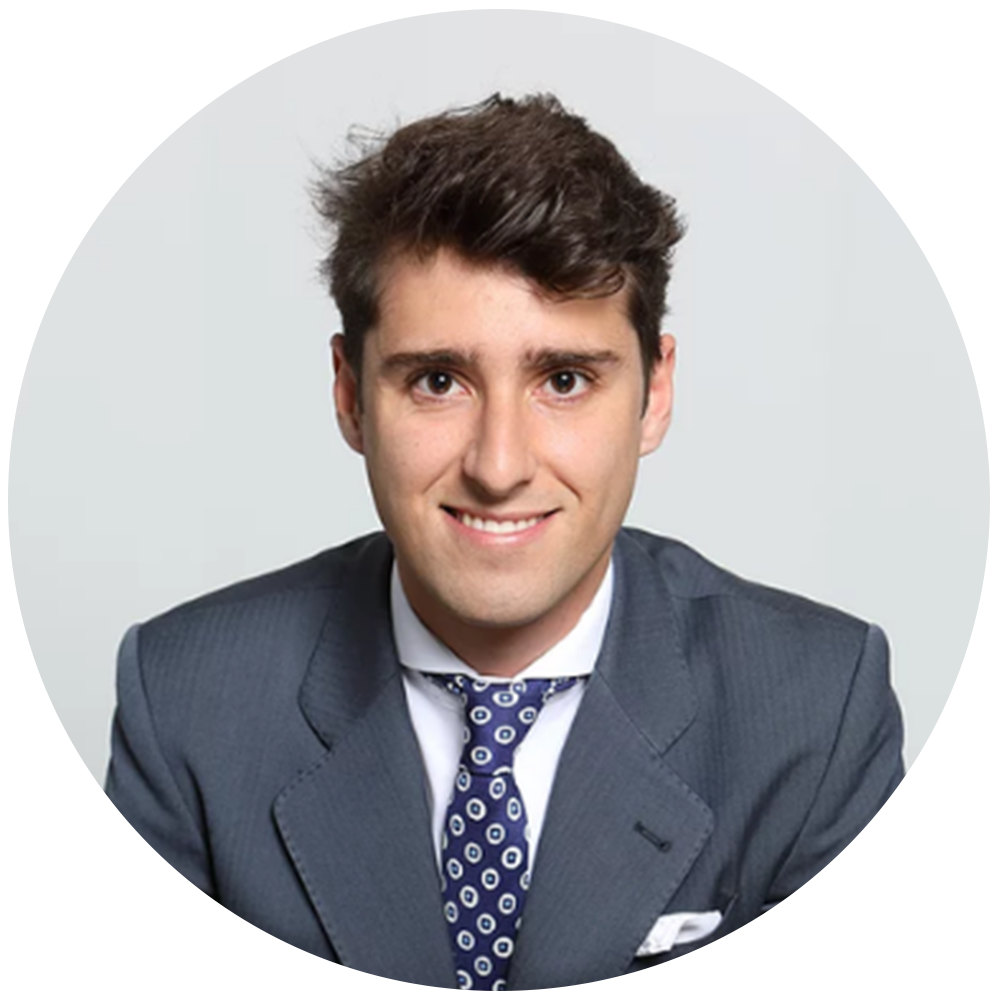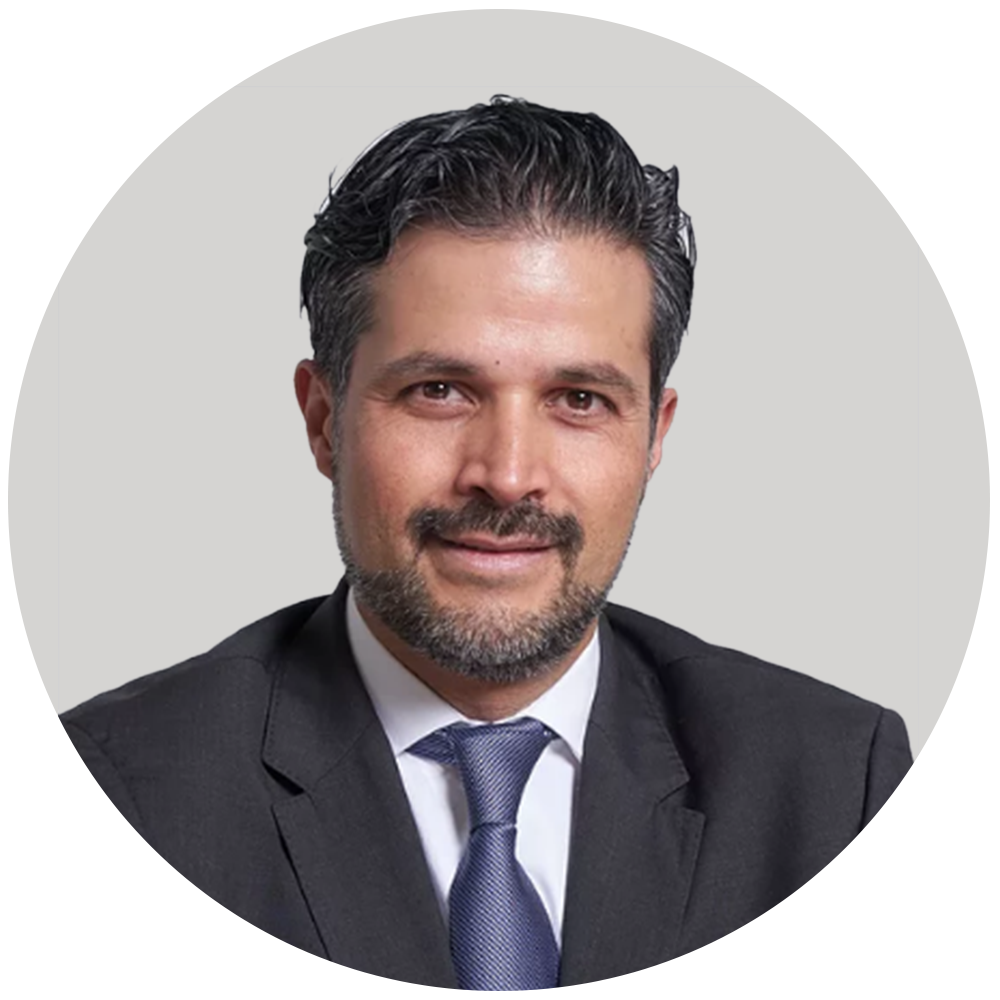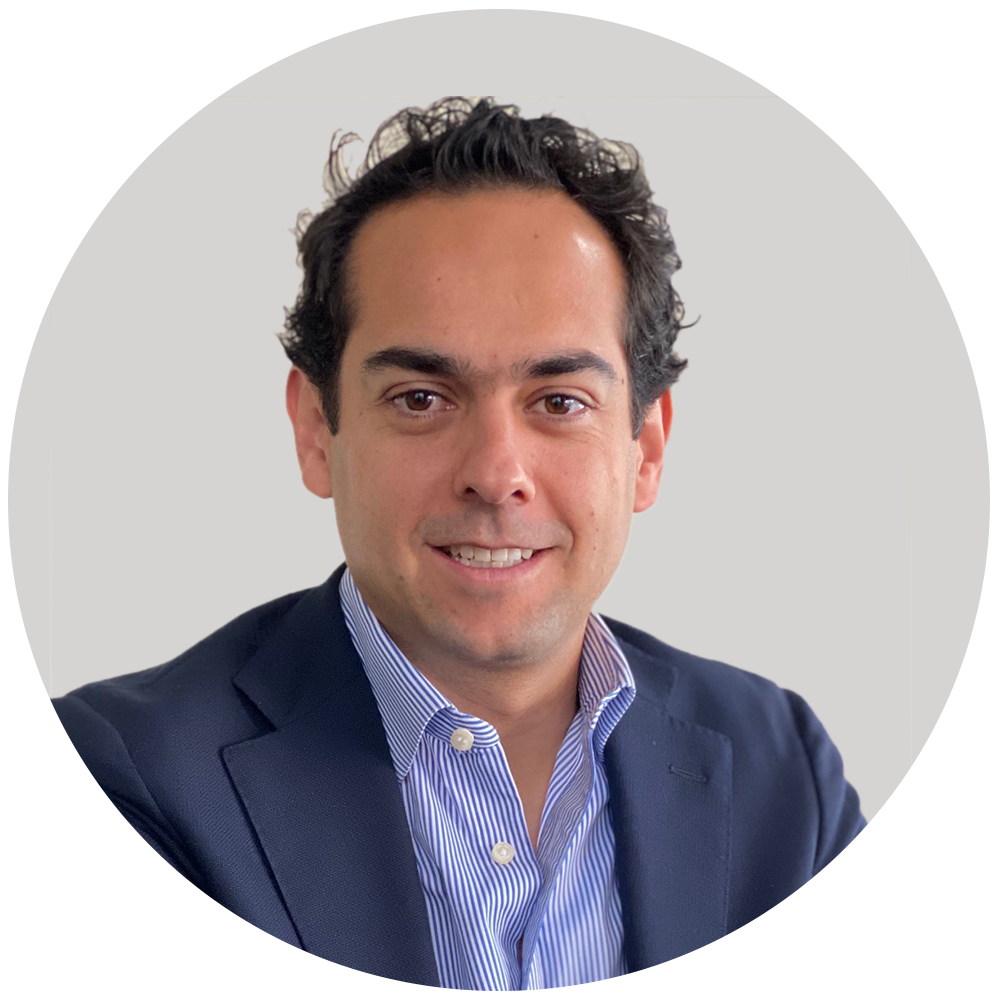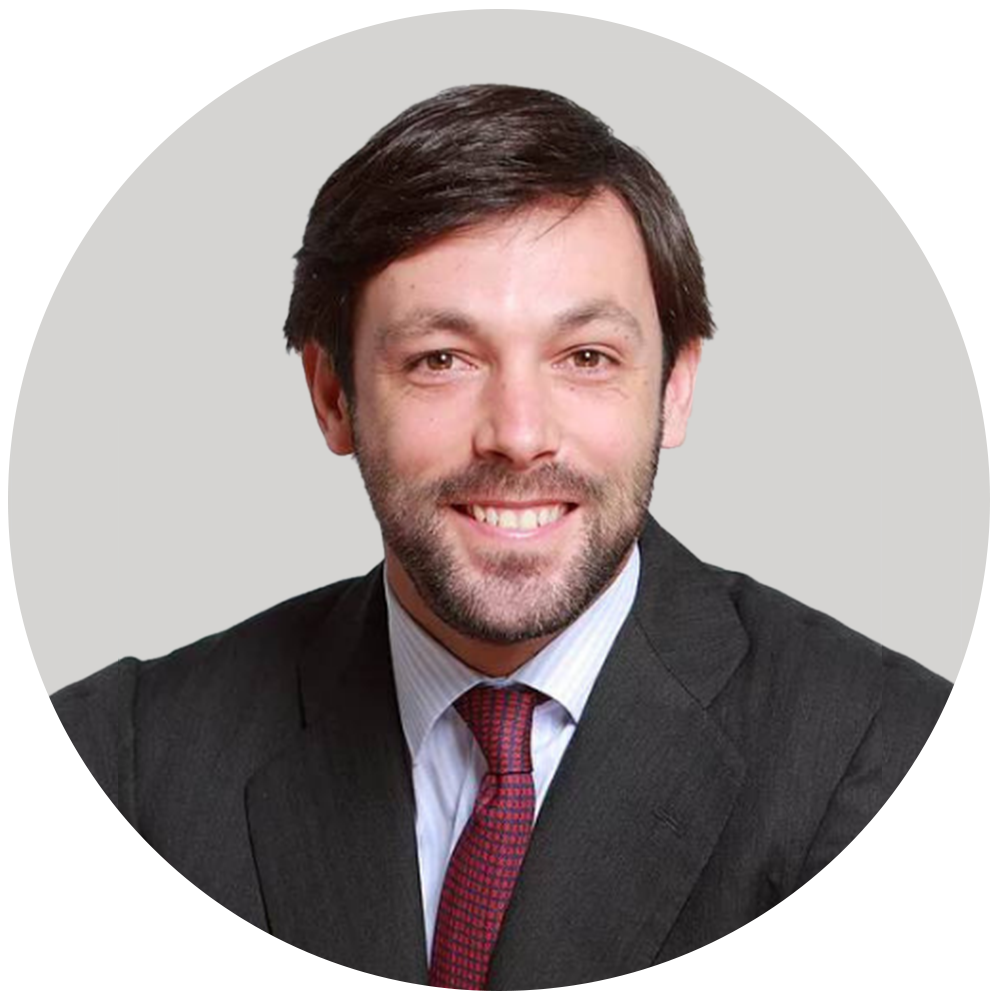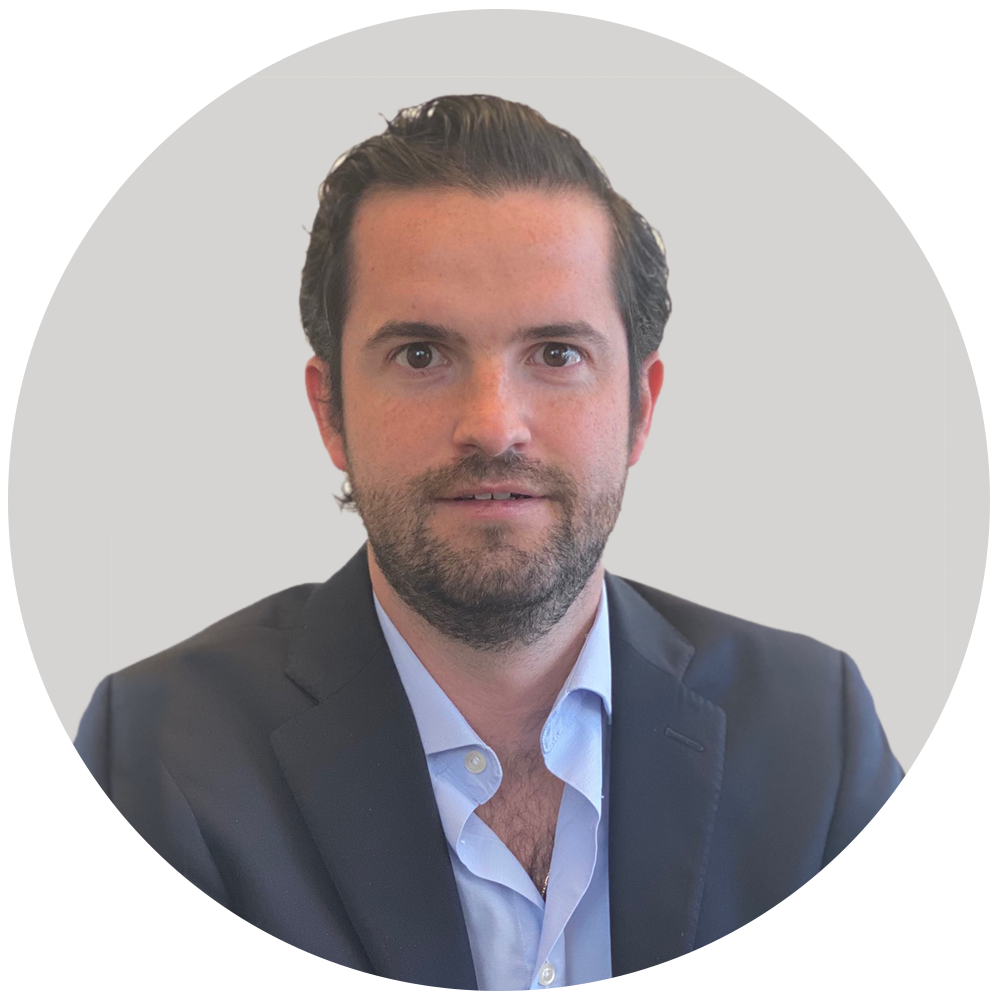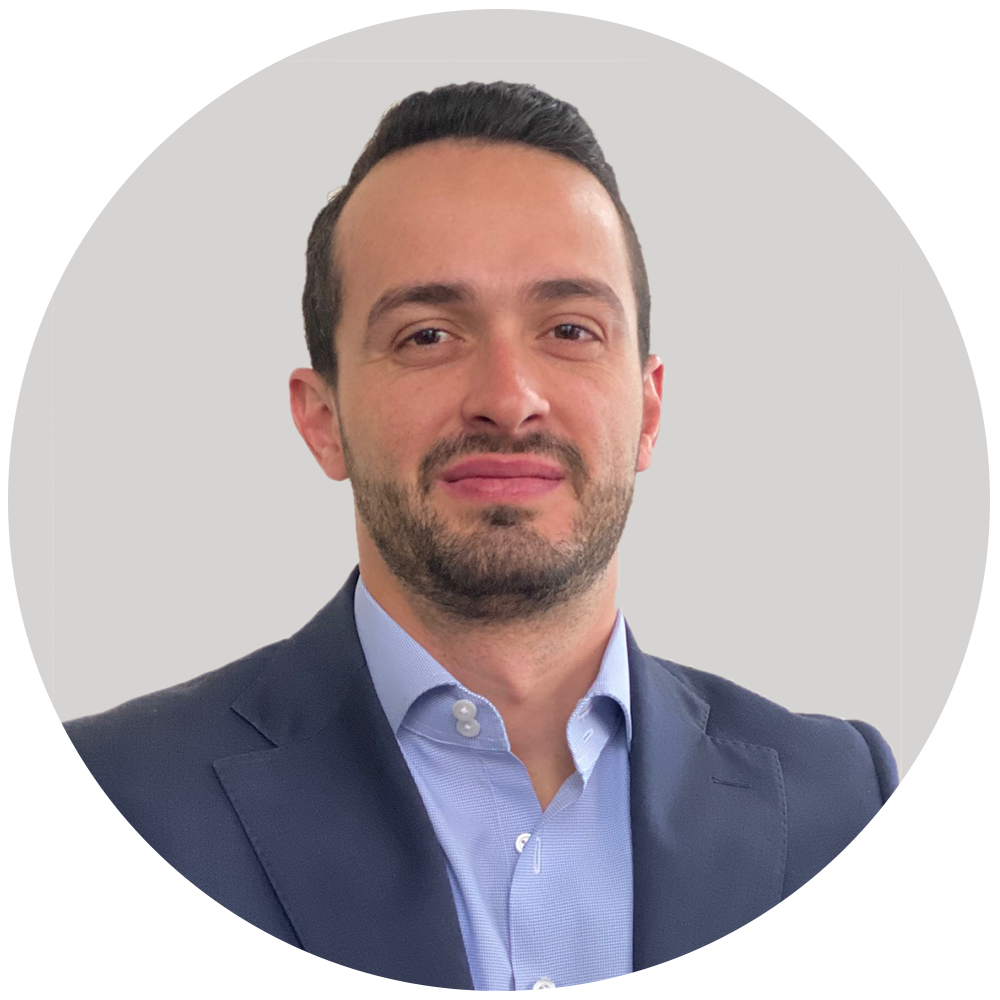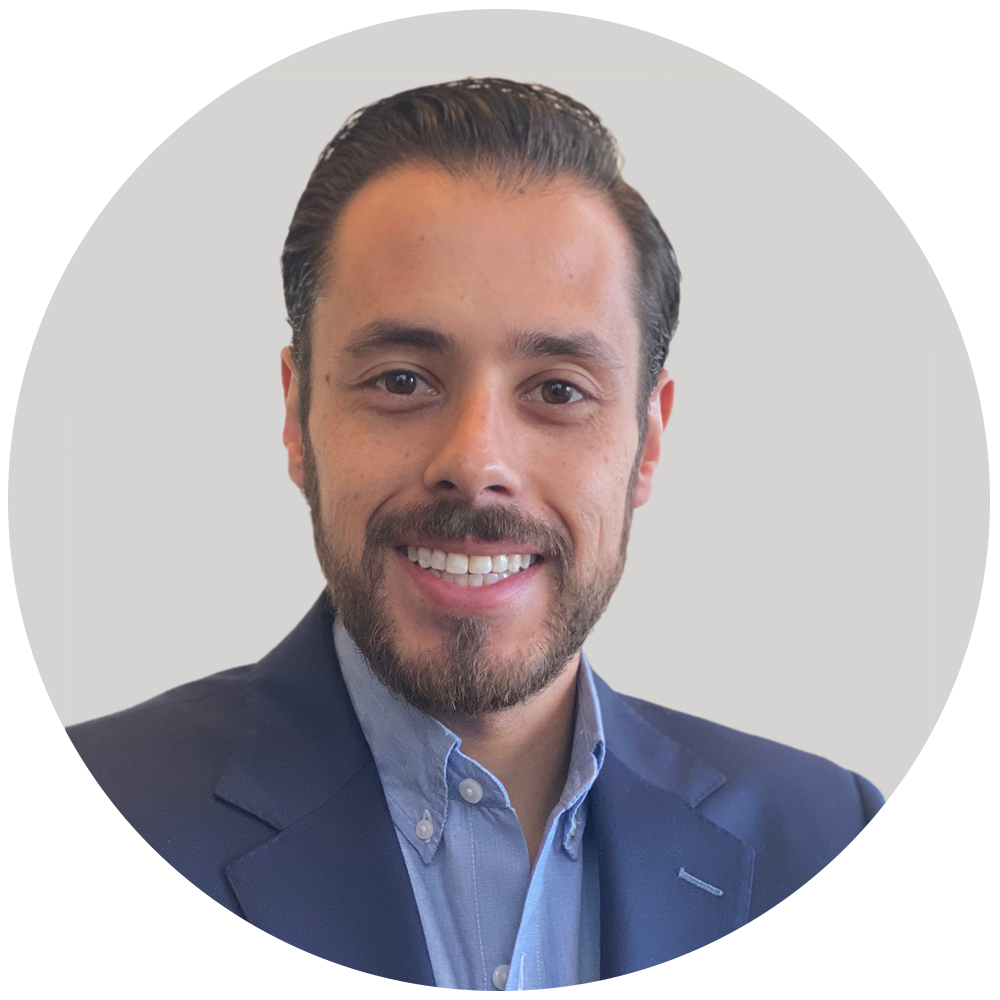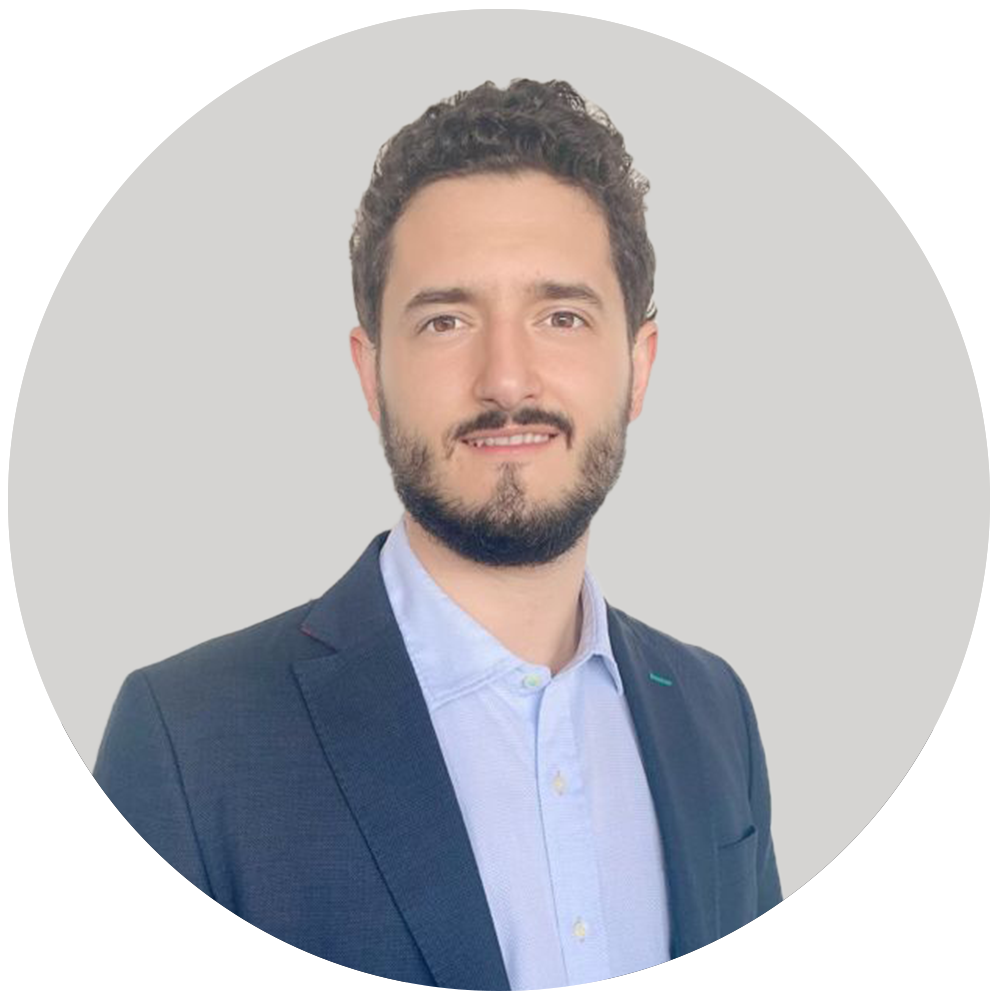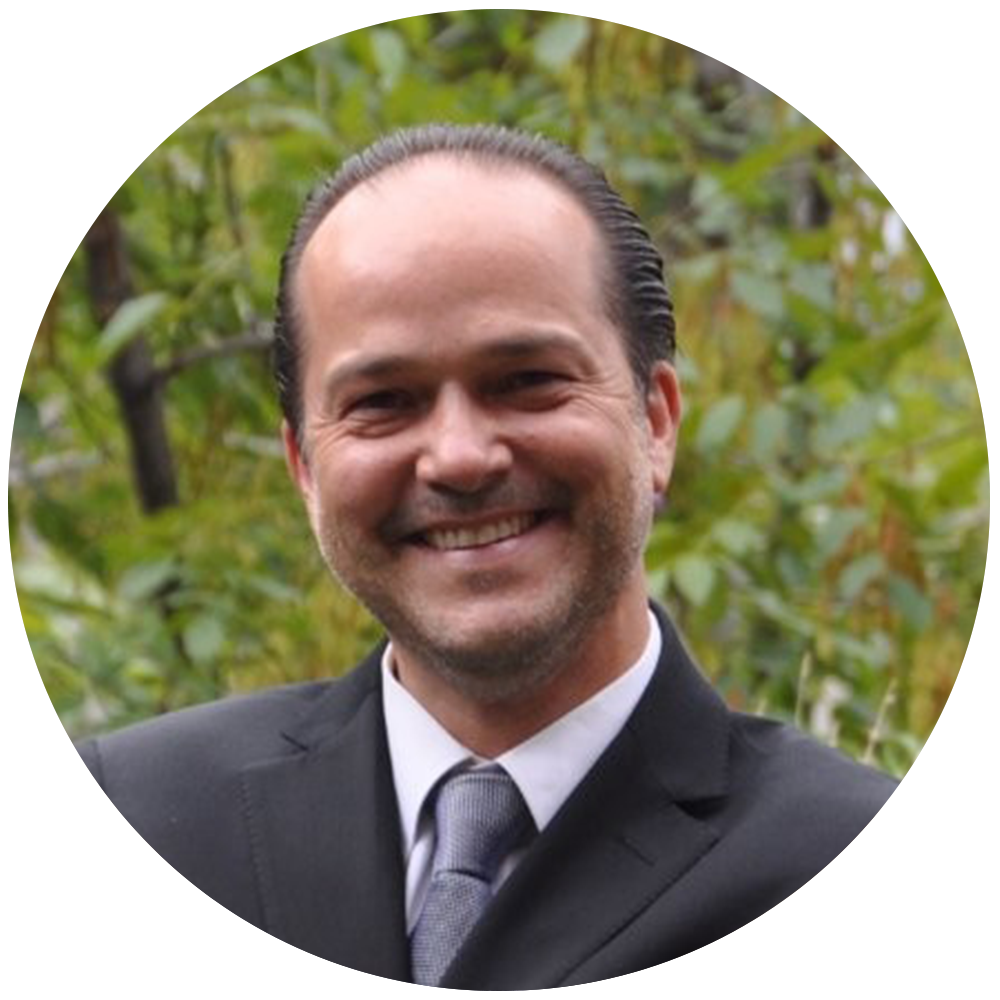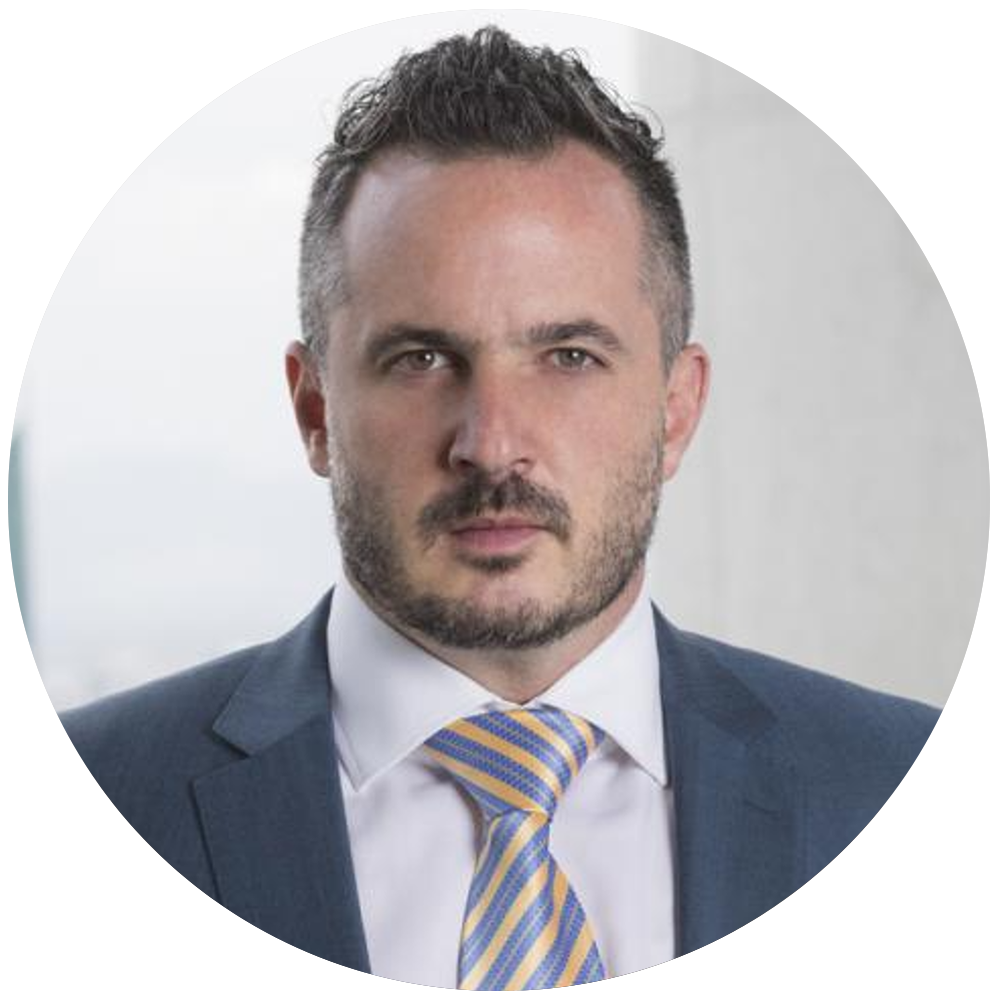Responsible Investment Policy
Nexxus, an alternative asset manager, through its private equity and mezzanine debt funds, provides flexible capital solutions to medium-sized companies with growth potential in Mexico, Spain and Portugal.
In consideration of the foregoing, Nexxus’ responsible investment policy is applicable both for capital investments through private equity funds and the granting of financing through mezzanine debt funds.
1. NEXXUS RESPONSIBLE INVESTMENT BELIEFS
At Nexxus we are convinced that the incorporation of social, environmental and governance (ESG) factors in our investment and financing processes and in the management of our promoted and accredited companies contributes to the creation of value in them, in addition to being an effective means of risk management in our investment activity.
We understand that acting as responsible investors is part of our fiduciary duty in a context in which our investors are actively working to align their financial and sustainability objectives.
We are aware that acting as responsible investors is a gradual process of incorporating best practices and a process of continuous improvement to which we are committed.
In addition, we believe that our activity must actively contribute to the achievement of the Sustainable Development Goals (SDGs) and we shall attempt to align our activities to make it possible. Thus, a priority for us is the contribution we can make to access to decent work and economic development (SDG 8) through job creation and growth of our promoted and accredited companies, the reduction of inequalities (SDG 10) and the contribution to gender equality (SDG 5).
2. PRINCIPLES AND COMMITMENTS
Our code of ethics provides for the following general principles that guide our actions: (i) respect for Human Rights and individual freedoms, (ii) preservation of the natural environment and (iii) collaboration with the development and well-being of the communities and the people with whom we interact.
We are committed in our activity and in that of our promoted and accredited companies to act in accordance with the values and principles recognized in the United Nations Global Compact on human rights, labor rights, the environment and the fight against corruption, and in the main international agreements in this regard signed within the framework of the United Nations, the International Workers’ Organization or the OECD.
When investing, we aspire to comply with the best practices as responsible investors and we have made public our commitment to responsible investment by signing the United Nations Responsible Investment Principles (UN PRI or Principles). As signatories we assume the following principles:
- Incorporate ESG issues into investment analysis and decision-making processes and the granting of financing.
- Incorporate ESG issues into our ownership policies and practices.
- Influence our promoted and accredited companies to report on ESG issues that concern them.
- Promote acceptance and implementation of the Principles within the private equity industry.
- Work together with other signatories to enhance effectiveness in implementing the Principles.
- Report on our activities and progress towards implementing the Principles.
3. MEANS AND DEDICATED EQUIPMENT
At Nexxus we understand that in order to respond effectively to the commitments assumed as a responsible investor, it is necessary to have an adequate corporate governance structure, for this:
- We provide training to investment teams on ESG,
- We have appointed a responsible ESG team within Nexxus made up of two partners, an officer and other members of the Nexxus team, who direct and coordinate the ESG activity of Nexxus and the promoted and accredited companies,
- We have the services of an expert consultant who works closely with those responsible.
- ESG and the investment and debt teams in the incorporation of ESG factors in the investment and financing processes.
- Within the promoted companies: (i) we make sure to analyze and socialize and implement ESG issues, (ii) the staff of the promoted company receives adequate ESG training and (iii) we appoint an ESG manager who coordinates the implementation of the ESG actions approved in the boards.
Within the accredited companies we request a periodic report of the ESG activities carried out during the relevant fiscal year.
4. INTEGRATING ESG FACTORS IN THE INVESTMENT OR FINANCING PROCESS
At Nexxus, we act as responsible investors in our day to day, integrating ESG factors in each of the phases of our investment and financing processes.
I. PRE-INVESTMENT/FINANCING
We have decided to exclude from our investment and financing universe a set of activities that are contrary to our principles and entail a high reputational risk.
The investment opportunities that we consider go through a prior comprehensive analysis in which we rule out investing in, and granting financing to, companies that participate in any of the following businesses or activities:
- Illegal economic activities: the manufacturing, marketing or other activity that is illegal under the laws or regulations of the jurisdiction of origin;
- Tobacco and distilled alcoholic beverages: the manufacturing and trade of tobacco and distilled alcoholic beverages and related products;
- Production and trade of arms and ammunition: the financing of the manufacturing and trade of arms and ammunition of any kind, including chemical weapons and the extraction, processing and/or sale of uranium for armaments;
- Casinos: financing of casinos and equivalent companies;
- Restrictions in the information technology sector: research, development or technical applications related to electronic data software or solutions specifically targeting internet gambling and online casinos;
- Life sciences sector: when supporting the financing of research, development or technical applications related to:
i. Human cloning for research or therapeutic purposes; or
ii. Genetically modified organisms (GMOs) - Dams that do not comply with the World Commission on Dams (WCD Framework);
- Mining or trading rough diamonds not certified by the Kimberley Process;
- Artisanal mining (mining using rustic tools normally without regulation);
- Manufacture, storage and transportation of Persistent Organic Pollutants (as defined in the Stockholm Convention) and of certain pesticides and hazardous industrial chemicals (as defined in the Rotterdam Convention);
- Activities related to nuclear energy that do not comply with the standards outlined by the International Atomic Energy Agency;
- Illegal logging and subsequent marketing of timber and related forest products; and
- Activities or projects in the energy sector within or adjacent to sites listed by UNESCO as World Heritage Sites.
Our list of exclusions is periodically reviewed to include controversial issues that are identified in ongoing dialogue with our investors.
II. EVALUATION
The companies that meet our investment/financing criteria are subjected to a prior analysis process by the investment or financing team, as appropriate, which includes: (i) the description of the company’s business, (ii) analysis of the sector, (iii) investment thesis, (iv) structure of the transaction, (v) strengths, opportunities and potential risks (including main ESG risks), (vi) expected returns, and (vii) preliminary business plan. This analysis is reflected in a document called Deal Alert.
III. FIRST INVESTMENT/CREDIT COMMITTEE, NEGOTIATION OF THE MEMORANDUM OF UNDERSTANDING AND APPROVAL OF THE DUE DILIGENCE BUDGET
In case it is decided to go ahead with the transaction, the responsible team shall begin the negotiation of a Memorandum of Understanding with the company based on a non-binding valuation. In this phase, a report is also prepared for the Investment Committee or the Credit Committee, as the case may be, which includes, among others, the budget approval for the due diligence analysis, including ESG matters.
IV. DUE DILIGENCE ANALYSIS
In due diligence analysis the focus typically shall be on the following:
- Investment/financing thesis and value creation plan (including internationalization);
- Management and alignment capabilities;
- Business and market analysis;
- Financial, tax and structuring;
- Legal and insurance;
- Information technology (if applicable);
- Viability of collateral in the case of financing; and
- ESG risks and opportunities.
The ESG due diligence analysis shall be performed by an external provider and shall cover, at least, the following:
- Analysis of the adequacy of the investment/financing to the policy of exclusions and restrictions in ESG matters defined in this policy;
- High-level analysis of the geographies and sectors in which the company operates in order to identify the main ESG risks and opportunities determined by the location and general characteristics of the activity carried out; and
- Specific analysis of the company that allows evaluating its risks and opportunities in ESG matters.
The ESG due diligence analysis shall ensure that the companies in which financing is invested or granted comply, at least, with the following requirements:
- Respect the human rights of its workers;
- Maintain safe and healthy working conditions for its employees and contractors;
- Carry out a responsible environmental management of its operations through the efficient use of natural resources and the mitigation of environmental risks and damages;
- Maintain standards of business integrity, avoid corruption in all its forms, and comply with applicable laws and regulations against bribery, fraud, and money laundering.
- Establish clearly defined obligations, procedures and controls for the application of best corporate governance practices.
The results of the analysis must be included in a report of conclusions and recommendations that must contain details of the most relevant issues from the ESG point of view for making an investment decision or granting of financing and recommendations to mitigate the identified ESG risks and exploit the potential opportunities found during the investment period or the term of the financing.
In cases where the due diligence analysis identifies material ESG risks, Nexxus shall require that the potential promoted or accredited company commit to applying the appropriate measures to mitigate those risks. Nexxus shall support the promoted or accredited company to do so by developing action plans with adequate objectives, timetables and resources.
V. APPROVAL OF THE INVESTMENT COMMITTEE OR CREDIT COMMITTEE
Once the transaction team is satisfied with the results of the due diligence analysis, the team shall prepare the Investment Memorandum and present it to the Investment or Credit Committee for final approval.
The Investment Memorandum must include, at least, a specific section dedicated to the main ESG risks and opportunities identified in the Due Diligence.
In that same committee, the 180-day Plan is also presented, which includes some of the recommended actions in the due diligence phase. The 180-day plan shall include at least good corporate governance and business continuity measures (measures to align and retain key talent).
VI. CREATION OF VALUE
During the investment phase, at least one of the senior members of the investment team shall join the board of directors of the promoted company from where they shall be involved in key operational and strategic decisions. Also, it shall ensure the implementation of the following ESG measures that are common to all promoted companies:
- The affiliation of the promoted company to the ESG policy of Nexxus; (ii) the appointment of an ESG manager in the promoted company;
- The inclusion of ESG matters on the agenda of at least two meetings of the Board of Directors per year;
- The approval of ESG measures within the framework of the 180-Day Plan, Value Creation Plan and Business Plan; and
- The definition and calculation of key performance indicators (KPI’s ESG) that allow monitoring the progress made.
Prior to the investment and with the objective of aligning all the parties involved in the relevant transaction, a Value Creation Plan or Business Plan that details the strategic objectives shall be agreed together with the rest of the partners and management team of the promoted company and the actions necessary to achieve these objectives.
Within the 180-Day Plan, the Value Creation Plan and the Business Plan, we evaluate actions that, in addition to contributing to the creation of value, generate a positive social and environmental impact.
Regarding the granting of financing, compliance with Nexxus’s Responsible Investment Policy shall be included as an obligation of the borrower, within the loan agreement and other documents of the transaction. The borrower shall also be required to prepare a periodic report on compliance with said obligations.
VII. DIVESTMENT
With regard to the exit, our goal is to be able to prove that, at the time of divestment or expiration of the loan term, we have contributed to the creation of a more sustainable company, from a social and environmental point of view.
5. TRANSPARENCY AND COMMUNICATION
Nexxus has signed the principles of responsible investment of the United Nations (UN PRI) to report its activities and progress in the implementation of the principles of responsible investment and thus, every year, it shall prepare the UN PRI Transparency Report.
Nexxus considers that transparency in ESG matters is also a responsibility of promoted and accredited companies and shall encourage them to report on ESG matters that concern them.
6. INTERNAL AND EXTERNAL PROMOTION OF RESPONSIBLE INVESTMENT
At Nexxus we believe that it is essential to lead by example and we try to apply the best ESG practices in our operation as an alternative asset manager, in our internal corporate governance structure, in the relationship with our collaborators, with the private equity industry and society.
Private Debt Responsible Investment Methodology
Nexxus, an alternative asset manager, provides flexible capital solutions to medium-sized companies with growth potential in Mexico, Spain, and Portugal through its private equity and debt funds.
In light of the above, Nexxus’ responsible investment policy establishes general guidelines for capital investments, and this document outlines the specific methodology for private debt financing in Mexico.
1. ESG FACTOR INTEGRATION PROCESS
Nexxus is committed to integrating Environmental, Social, and Governance (ESG) factors and best practices into all its activities. This methodology for assessing ESG factors aims to measure a company’s resilience to financially relevant long-term ESG risks.
I. PROCESS SUMMARY
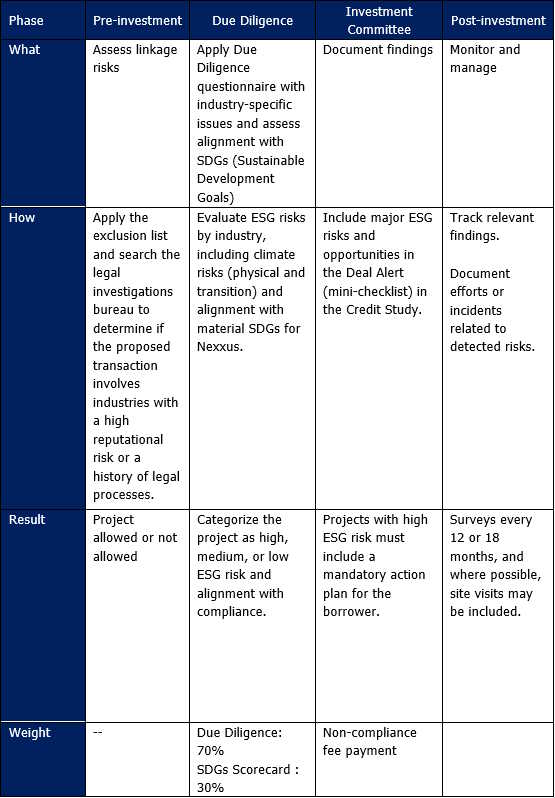
II. EXCLUSION LIST
In line with the exclusion list of the “Principles for Responsible Financing” of the European Development Finance Institution (EDFI), we will not finance any activity, company, or project engaged in:
- Forced labor or child labor
- Activities or materials considered illegal under the laws or regulations of the host country or international conventions and agreements, or subject to international eliminations or bans, such as:
a) Substances depleting the ozone layer, PCBs (Polychlorinated Biphenyls), and other specific hazardous substances like pharmaceuticals, pesticides/herbicides, or chemicals.
b) Wildlife or products regulated by the Convention on International Trade in Endangered Species of Wild Fauna and Flora (CITES); or
c) Unsustainable fishing methods, such as explosives and drift net fishing in the sea using nets longer than 2.5 km.
- Cross-border trade in waste and waste products unless it complies with the Basel Convention and underlying regulations.
- Destruction of high conservation value areas
- Unbonded radioactive materials and asbestos fibers
- Pornography and/or prostitution
- Racist and/or undemocratic media
- When the projects or activities funded, the following activities represent more than 10% of their overall balance or profits:
a) Alcoholic beverages (except beer and wine)
b) Tobacco
c) Weapons and ammunition
d) Betting, casinos, or equivalent enterprises
Our exclusion list is periodically reviewed to include controversial issues identified in ongoing dialogue with our investors.
III. LEGAL INVESTIGATIONS BUREAU SEARCH
Companies, ultimate owners, and/or members of the Board of Directors will undergo a search in the Legal Investigations Bureau (BIL) in the following categories:
a) Local courts
b) Federal courts
c) Labor boards
d) SAT (Mexican tax authority), suspected false operations, and delinquent taxpayers
e) Suppliers sanctioned by the SPF (Federal Protection Service)
f) PROFECO (Federal Consumer Protection Agency) complaints
g) Sanctions by the National Banking and Securities Commission
h) Sanctions by COFEPRIS (Federal Commission for Protection Against Sanitary Risk)
i) Linked to a legal process
j) PROFEPA (Federal Attorney for Environmental Protection)/SEMARNAT (Secretariat of Environment and Natural Resources);
IV. STANDARD FACTORS INCLUDED IN THE DUE DILIGENCE
a) Environmental considerations
- Inventory of emissions and greenhouse gas (GHG) emissions
- Air pollution
- Waste management, including impact on land and water
- Energy efficiency
- Land use
b) Social considerations
- Diversity, equity, and inclusion, including anti-discrimination mechanisms
- Human rights and modern slavery
- Health and safety of employees
- Privacy and customer safety
- Product quality and safety
c) Governance considerations
- Anti-corruption, anti-bribery, and fraud mechanisms
- Management of conflicts of interest
- Transparency, including operational and financial reporting
- Corporate governance structure
- Risk management
V. SUSTAINABLE DEVELOPMENT GOALS (SDG) ALIGNMENT SCORECARD
The SDG alignment scorecard works by taking weighted averages based on different categories and summing up points. As a result of materiality analysis, Nexxus has four mandatory SDGs against which all investments must be measured, regardless of the sector, as these are the ones that will allow us to generate the most impact.
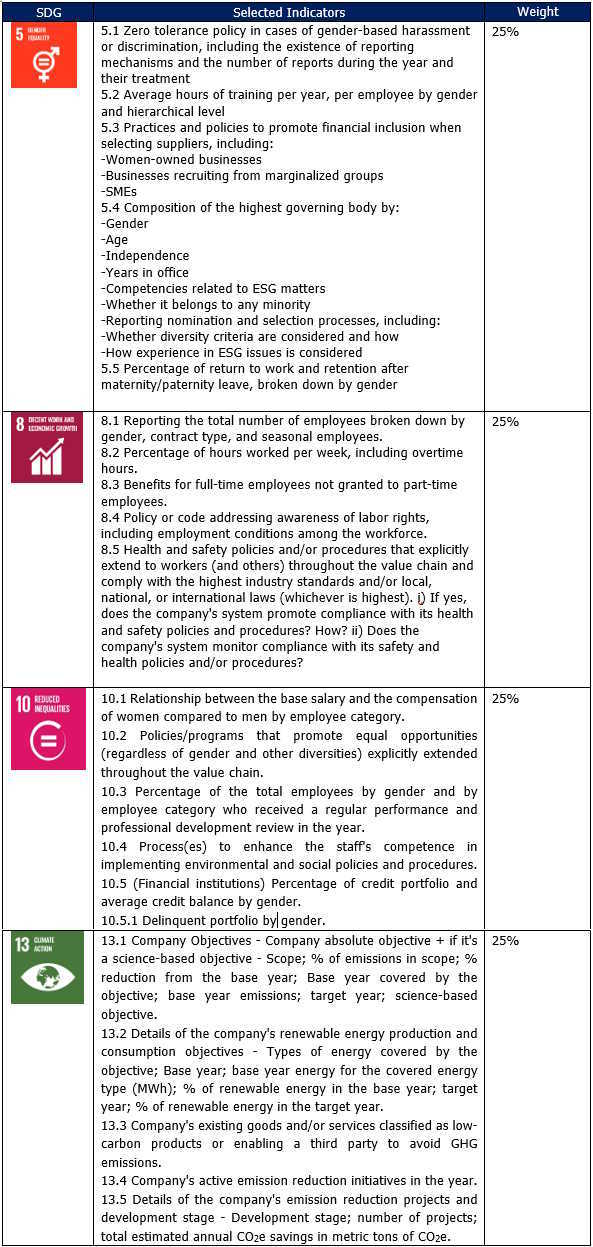
VI. KEY INDICATORS FOR DEAL ALERT
1. Confirmation that the project/company has no activity in any of the exclusion list sectors.
2. Due Diligence Score with relevant findings by category.
3. Alignment Score with Sustainable Development Goals (SDGs).
VII. DIVESTMENT
In preparation for the exit, our goal is to demonstrate that, at the time of divestment or credit term termination, we have contributed to the creation of a more sustainable company from both a social and environmental perspective.

